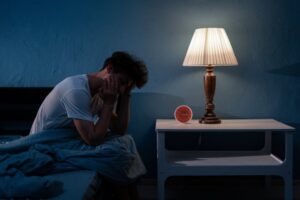Sleep Apnea and Drooling
October 2, 2025

Waking up to a wet pillow or noticing that you drool excessively at night can be both uncomfortable and embarrassing. While occasional drooling is common and usually harmless, persistent drooling may be a sign of an underlying issue — including sleep apnea. Understanding the connection between sleep apnea and drooling can help you identify potential problems and seek the right treatment.
What is Sleep Apnea?
Sleep apnea is a sleep disorder that causes repeated pauses in breathing throughout the night. The most common type, obstructive sleep apnea (OSA), occurs when the muscles in the throat relax too much, blocking the airway. This disruption leads to snoring, gasping for air, poor sleep quality, and a variety of other symptoms — including excessive drooling.
Why Sleep Apnea Can Cause Drooling
Several factors related to sleep apnea can contribute to drooling during sleep:
- Mouth Breathing: People with sleep apnea often breathe through their mouths because their nasal passages are blocked or their airway collapses during sleep. Mouth breathing increases saliva evaporation and production, leading to drooling.
- Sleeping Position: Those with sleep apnea tend to sleep on their sides to reduce snoring and airway obstruction. This position, however, allows saliva to pool and leak out of the mouth more easily.
- Poor Muscle Control: Sleep apnea can cause disruptions in muscle tone around the mouth and throat. When these muscles relax excessively, it becomes harder to control saliva flow, resulting in drooling.
- Oral Appliances: Some sleep apnea patients use oral appliances designed to reposition the jaw or tongue. While effective for managing airway obstruction, these devices can sometimes cause an increase in saliva production.
Managing Drooling and Sleep Apnea
If you experience excessive drooling along with other symptoms of sleep apnea — such as loud snoring, daytime fatigue, morning headaches, or gasping for air at night — it’s important to speak with a dentist or sleep specialist. They may recommend:
- A sleep study to confirm a diagnosis of sleep apnea.
- Continuous positive airway pressure (CPAP) therapy to keep your airway open.
- Custom oral appliances that improve breathing and minimize drooling.
- Addressing nasal congestion or allergies that contribute to mouth breathing.
While drooling on its own may seem harmless, persistent nighttime drooling can sometimes indicate an underlying problem like sleep apnea. Fortunately, with proper diagnosis and treatment, both drooling and sleep apnea can be effectively managed. Addressing the root cause not only improves your sleep quality but also supports better overall health and a drier pillow in the morning.
About the Practice
Are you often tired during the day? Do you wake up with a wet pillow from drooling? If so, you might benefit from sleep apnea treatment at Souris Valley Dental Group. For your convenience, we offer both in-office and at-home sleep testing. Our sleep apnea therapy is customized to you, and you’ll appreciate our comfortable dental office and caring dental family. If you’re ready to take your sleep back, schedule an appointment with us online or call (701) 852-5595.
No Comments
No comments yet.
RSS feed for comments on this post.
Sorry, the comment form is closed at this time.
